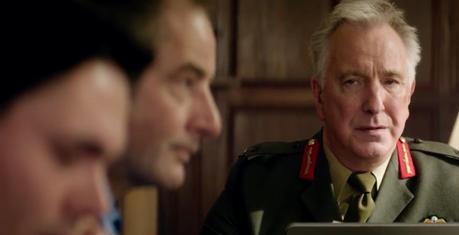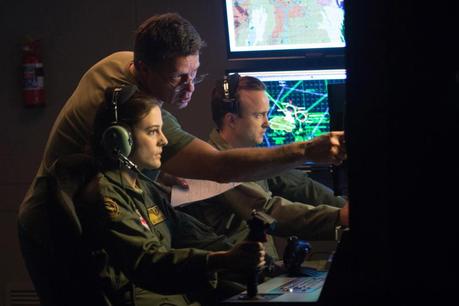Eye in the Sky is the rare beast in cinema: an edge of your seat ethics debate. Nearly all of the affected parties of the depicted drone warfare scenario are given a seat at the (often virtual) table to express their views, and while the debate ultimately boils down to whether or not the needs of the many outweigh the needs of the few or indeed one Eye in the Sky never pretends it’s truly that simple. Where you might happen to fall on the ethical divide, though, shouldn’t matter because on a very basic level Eye in the Sky can be purely enjoyed as a master class in how to build tension.
Here’s the set-up: A joint UK-US-Kenyan operation is in play to capture two high-level Al-Shabaab extremists and two new recruits, one a UK citizen and the other a US citizen, who are all meeting in a safehouse in Nairobi, Kenya. Colonel Katherine Powell (Helen Mirren) commands the mission from England, relying on real time aerial footage from a drone plane piloted by two USAF soldiers stationed in Nevada (Aaron Paul, Phoebe Fox), on the ground intel/spy footage from undercover Kenyan field agents (led by Barkhad Abdi) and facial recognition confirmations from a Hawaii-based US officer. If given the order, Kenyan troops are prepared to deploy out of a military hanger to executive the capture operation. However, before Powell can give such an order she must first obtain authorization.
Powell’s superior, Lieutenant General Frank Benson (Alan Rickman, in one of his final roles), is supervising the mission from London along with key members of the UK government, including the Attorney General, a high-ranking Minister and several others. The terms of the mission have been approved by all-involved governments, but should there be any kind of alteration to those terms the men and women at the table with Benson in London have to re-assess and re-authorize.

A worthy near-final performance
Of course, that’s exactly what they end up being asked to do when unexpected circumstances up the mission from capture to kill. The two new Al-Shabaab recruits are being outfitted with suicide bomb vests, thus presenting an immediate threat to untold numbers of innocents. However, a little girl has set up shop to sell bread just outside of the safehouse, completely in the dark as to what’s happening behind her. Should they bomb the safehouse the intended targets will surely die but so will the little girl.
It’s an unenviable position to be in, so much so that pretty much everyone other than Powell and Benson continually attempt to wash their hands of responsibility by referring the decision further and further up the food chain. There is an almost absurd Dr. Strangelove quality to the continual phone calls interrupting important politicians in the middle of diplomatic appearances, but it’s obviously played completely straight instead of for comedy. As a sort of ode to the bureaucracy of modern warfare, this section of the film tells us just how much war in the age of the drone alarmingly resembles tired parents greeting their child’s request to do something with “I think you need to ask your dad first” only to then have the responsibility thrown right back at them (e.g., “Just as long as your mom says it’s okay.”)

Gavin Hood on set with Phoebe Fox and Aaron Paul
While all of the military, political and legal angles are being weighed, measured and debated, director Gavin Hood brilliantly keeps us engaged and never loses track of the many, many plates he has spinning in the air. Other than perhaps the little-seen, Hawaii-based facial recognition expert, every single character has a clearly defined viewpoint, even if their agenda is mostly to cover their own ass. We continually check in on all of them, inevitably captivated by Helen Mirren’s steely determination and Aaron Paul and Phoebe Fox’s extreme anguish over being the people who’ll have to pull the trigger.
From beginning to end, we never do manage to quite leave the edge of our seat. That’s an impressive accomplishment since other than Barkhad Abdi and the little girl none of these characters we are spending time with are actually in any immediate physical danger. However, Hood’s seamless and propulsive crosscutting between locales in combination with Paul Hepker and Mark Kilian’s insistent score ratchets up the tension, enabled greatly by a script which deftly sets up multiple ticking clock-esque scenarios.
Abdi, stationed dangerously close to the safehouse, is in constant danger of being discovered by one of the Al-Shabaab soldiers. The footage he is capturing inside the house via a spy cam effectively counts down to destruction based on the number of canisters slowly being placed into each suicide vest. Similarly, we count how many pieces of bread the little girl has on her table and hope that it somehow gets down to 0 so that she can then go home, free from harm. Plus, there is the literal countdown Aaron Paul does each time he is about to fire a missile from the drone.
Moreover, we actually spend just enough time with the key characters at the beginning to come to like or at least understand them as people, thus furthering our investment in their turmoil. We see Mirren waking up early and walking throughout her house with her dog while her husband slumbers. Paul drags himself out of bed, and makes small talk at the office with his new rookie partner, revealing this job is just something he did to pay off massive student loan debt. Rickman shops for a doll for a granddaughter, revealing just how clueless he is about the absolute minute differences between branded children’s toys. Then we get to see them at the end of the day, observing how exactly they weathered the moral burden the day’s events delivered to their shoulders.
And then we walk out of the theater debating whether or not what they ended up doing was morally, tactically, or politically acceptable.
THE BOTTOM LINE
As a practical film version of a TED talk on the ethics of drone warfare, Eye in the Sky is as nuanced, engaging and timely as it possibly could be. As a master class in how to build tension through plotting, editing, musical score and performance, it’s a must-watch.
ROTTENTOMATOES CONSENSUS
94% – “As taut as it is timely, Eye in the Sky offers a powerfully acted — and unusually cerebral — spin on the modern wartime political thriller.”

